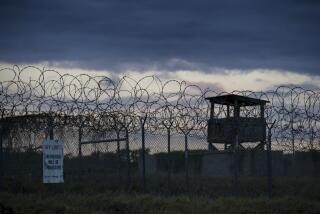Pakistani Nuclear Scientist Freed After 2 Years in Jail
- Share via
ISLAMABAD, Pakistan — A senior scientist suspected of helping sell nuclear weapons technology to Iran, Libya and North Korea has been released after two years in detention, the army said Sunday.
Mohammed Farooq, who worked at Pakistan’s top nuclear weapons facility, Khan Research Laboratories, was detained in December 2003 along with 10 others when it was revealed that the head of the facility, Abdul Qadeer Khan, had spread sensitive technology on the international black market.
Farooq, who was director general at the laboratories, was suspected of leaking technology on Khan’s orders.
He was freed last week and told to stay at home for “security reasons,” army spokesman Maj. Gen. Shaukat Sultan said.
Sultan reiterated the Pakistani government’s position that no one from abroad -- including U.S. officials and the International Atomic Energy Agency -- would be allowed to question Farooq about the black market network Khan led.
Sultan would not say whether Farooq was found guilty of any wrongdoing or discuss any details about the investigation into his activities. There was no immediate comment from Farooq or his family.
Sultan also would not comment on why Farooq was held longer than the other nuclear officials, who were released by July 2004.
Khan confessed in February 2004 that he sold nuclear secrets to Iran, North Korea and Libya.
President Gen. Pervez Musharraf pardoned Khan because he built a nuclear program for Pakistan, a conservative Islamic state, and put it in the same league as archrival India. The two countries carried out nuclear tests in 1998.
Khan has since been confined to his home in Islamabad under tight security.
The IAEA has said Khan’s network provided Iran with detailed designs for the core of a nuclear warhead and supplied Libya with information for its now-dismantled nuclear weapons program that included an engineer’s drawing of an atomic bomb.
More to Read
Sign up for Essential California
The most important California stories and recommendations in your inbox every morning.
You may occasionally receive promotional content from the Los Angeles Times.










